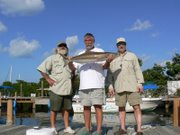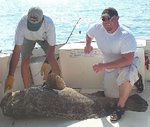Hurricanes, Floods and Blizzards, Oh My!- Is Climate Change the Cause?
Having something to blame is comforting, but is everything really due to climate change?
My conversation with Joel's uncle Will last night turned to global warming among a few other things. I read a lot about the political science debate on what is now called climate disruption. The debate on how soon and how much mankind's wicked wasteful ways has on climate will rage on for a while. Most of you may have noticed that everything bad, weather wise, is due to climate change, at least in the press. So what's the deal?
It is often mentioned that the global average temperature is about one degree Fahrenheit warmer now due to anthropogenic global warming or greenhouse gases added to the atmosphere by man's activities. In actuality, as much as half of that “may” be due to man. Why that one degree is reported so often is a mystery. Even the warm activists in the science community do not say that it is one degree. The one degree F or about 0.7 degrees Centigrade is the approximate rise in average temperature since the late 1800's. Global climate has made some changes in the past and will continue making changes in the future. Such is the nature of climate, it changes. That is why we have hundred year weather events. Nasty weather things that happen, just not very often.
With the most that man “may” have increased average temperatures by at 0.5 degrees F, is that enough to blame the greenhouse scape goat on the flooding in Australia, Pakistani and Brazil? Not really. Most of the much publicized climate change weather disasters should not kick in until global temperatures increase over one degree above average. So blaming everything from floods to blizzards on climate change now, is a bit disingenuous. The current maximum temperature due to man is smaller than the normal natural variation of climate. Maybe's, possibility’s and partiality’s should proceed any comments about weather and man made climate change at this point in time. We don't get those caveats because it don't scare people enough unless you accentuate the negatives.
A variety of scientists have noticed that natural climate variability has been neglected in favor of more exciting man made climate disruption. They get little press. Everybody needs a villain, even if that villain happens to be us. Blaming nature, God or chance on disaster has been done to death, so global warming/climate change/climate disruption is the villain of the decade. Should the impact of carbon dioxide in the atmosphere kick in, a whole new class of millennial scale weather events will be defined. The floods in the news now are tragic more because seven to ten day weather forecasts are not accurate enough to warn people to run from the coming disaster. There are forecast models that could have warned people to run, but the uncertainty of the forecasts makes it difficult to scare the hell out of millions to inspire them to take a quick holiday. Some of the better forecast models are double top secret. Paid for by private industry and not available for governments to use. Weird huh! A real life conspiracy theory in this age of rationality?
That is true by the way. Private mega industries spend big bucks getting the best forecasts so they can save bigger bucks and those forecasts don't come from government weather bureaus. Those special forecasts are not perfect, just enough better than the national weather services to justify the cost. Even with the better forecasts, the political and financial cost of relocating millions of people makes it nearly impossible to give residents of a potential flood area adequate warning. One, billion dollar false alarm, could disrupt local economies and political careers. Don't worry though, the governments are working on that, feel better?
There are so many things wrong with the current science/political situation of climate disruption it is hard to find a starting point. Well, not really that hard. Science/political is a clue. Scientists should be doing scientific stuff and politicians should be doing political stuff, not vice versa. I mean really, we can kick the politicians out. Scientists are a little more difficult. Remember scientists are very smart people that opted to stay in school instead of getting real jobs like normal folks. Scientists are special. Scientists are also human.
Memorable scientists discovered things that revealed stuff about something that improved knowledge of ourselves or our world. That is why they are memorable. Most of these memorable scientists also discovered things that helped them discover that what they discovered was wrong (GASP!) They are human after all and as scientists, part of their job is to disprove other scientists and even themselves. Thanks to selective memory we tend to remember the scientific successes more than the failures. It is a part of human nature and science.
When science and politics merge we get a whole new critter to deal with. Everyone knows you can't trust politicians but everyone is conditioned to trust scientists. That makes science/politics a conundrum. A simple rule of thumb should be to go with your political savvy and stick to the distrust. That is called skepticism, which scientist/politicians call denial. So the new problem is that Joe average actually has to learn to think for him/herself about complicated stuff. So if Joe is smart he will find Mrs. Betsell, his fifth grade math teach and apologize for being a butt wipe and checking out Martha White instead of his text book.
One of the reasons that science/politics is so screwed up is Solomanesque politics does not improve scientific results. Splitting the difference between scientific opinion means you are guaranteed the wrong answer, just the error is smaller than if you picked the wrong scientist. A good example is former scientist turned political activist, James Hansen. James, feels that the magnitude of man's impact is a number 4 while his colleague, Syukuro Manabe feels it was 2 degrees C. As a result, the IPCC settled on the average of 3 degrees C and established a range of climate sensitivity of 1.5 to 4.5 with 3 degrees C as the probably sensitivity. The actually range should be 1.5 to 2.5.
Why should the range be 1.5 5o 2.5? You have to go back to Arrhenius, the guy that came up with the theory of global warming to get a clue. Arrhenius, set out to prove his theory that the ice ages and interglacial periods in Earth's history were caused by variation of carbon dioxide concentrations, the greenhouse effect, that is very poorly named. His value of climate sensitivity originally was between 4 and 5 degrees C. About a decade after his global warming theory, Arrhenius changed his mind and said the value of climate sensitivity was 1.6 degrees C. Oddly, his original estimate, which he changed, is quoted much more often than his revised estimate (This seems to happen a lot in climate science). There are quite a few scientists that estimate in the range of 1 to 2 degrees C for sensitivity. The results of the models appear to indicated that the value 3 C is an over estimation. So a very good guess is that sensitivity is less than 3 degrees C. By the way, my guess is just as valid as the IPCC's and didn't cost squat.
What's the big deal? Well, 3 degrees C and above is what I call crispy critter range, not good. Two degrees C is PITA range and 1 degree C is potentially a good thing, at least not as bad a thing. Now the lower range doesn't mean we are home free. Smart, pragmatic people would hedge their bets and take smart, pragmatic action. Judging by the frequent financial bubbles that are screwing the world economy, smarts and pragmatism are commodities is short supply. That means that this final part of my little paper is going to be totally lost on the majority of people that happen to read it.
Reasonable actions to reduce fossil fuel use, improve forest management, and not dicking with food supplies for energy, are smart and pragmatic.
Oh, by the way. The weather is gorgeous, the fish are biting and I am open for a couple days. Marathon in the Florida Keys should be your next fishing vacation destination. Join us for charter fishing, fishing guide trips or our fishing 101 so you can fish on your own with better success.
Tight lines,
Capt. Dallas




No comments:
Post a Comment